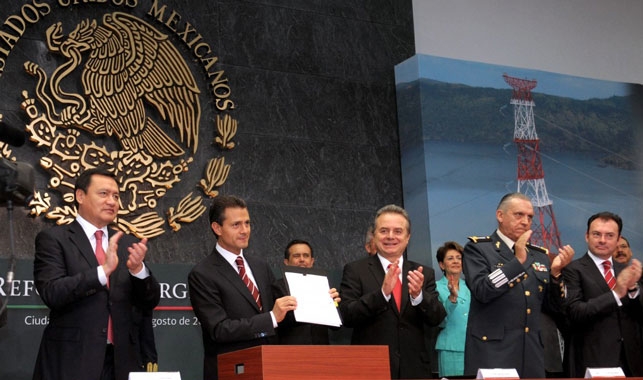Mexico's Energy Reforms: What Does It Mean For The U.S.?

For Mexico's northern neighbor, the question is how do these reforms affect the average American consumer, the North American energy sector, and the overall U.S. economy?
According to energy and economic analysts, the answer is simple: A lot.
These changes have the potential to dramatically alter North America's energy markets—a discussion most politicians and pundits in Washington, D.C. and on AM talk radio are actually referring to (usually by accident) when they wax poetic about "American energy independence."
Coined as a "quiet energy revolution" by Bloomberg, the proposed reforms of the energy sector in Mexico would, for the first time since 1938, allow foreign companies (including American entities like Chevron and Exxon Mobil) to establish "profit-sharing contracts" with the state-owned oil company, Pemex, for oil exploration and export. While foreign companies would still be prohibited from running oil fields on their own in Mexico, the reforms would allow for profit sharing and are designed to help invigorate Mexico's energy industry, which suffers from a lack of investment in modern and efficient infrastructure and exploration.
Under the current proposal, foreign companies would be able to receive a share of profits, but not reserves of oil. Critics of Peña Nieto's reforms, including his opponent in the 2012 presidential election, have said that this contractual caveat would prevent large companies from signing contracts with Pemex and making sizeable investments. An executive with an independent U.S.-based oil company told Reuters that the inability for foreign companies to own the reserves could prevent these reforms from being "a game changer."
However, others, including the president of Peña Nieto's political party, the PRI, have suggested that the energy reforms would be the biggest win for the Mexican economy since the enactment of NAFTA in 1995. PRI president Cesar Camacho said that the reforms would "create a world-class company" in Pemex, but "won't privatize" Mexico's oil industry. Juan Pardinas Carpizo, the CEO of the Mexican Institute for Competitiveness, said that the reforms were a "positive step," but that its successes will be judged based on Mexico's ability to attract investment, talent, human capital, and technology.
Pemex has suffered from a lack of investment in infrastructure and exploration. In July, its oil output was at its lowest point in 18 years and Pemex is, according to Bloomberg, heading toward a ninth straight year of declining production. Since 2001, Mexico's "proven reserves" (oil commercially recoverable under current conditions) have fallen by 41%. Analysts have reported that at Pemex's current rate of extraction, Mexico will exhaust its existing reserves by 2022.

The opening of Mexico's energy industry should be seen as an opportunity to not only make potentially profitable investments for American oil companies (and a boost for the stock market), but also as part of the U.S.'s stated goal of North American energy independence and breaking away from dependence on importing oil from OPEC. In a press release on Monday, U.S.-based Chevron Corporation welcomed "any decision ... by Mexico to provide new opportunities for investments."
For the North American consumer, these reforms have the potential to not only create high-paying energy jobs for Mexicans and Americans, but also dramatically boost the Mexican economy. With the interconnectedness of the U.S. and Mexican economies, a boost for one means a boost for both.
Peña Nieto has been pushing to double Mexico's economic growth which has trailed the rest of Latin America over the last ten years, and during his 2012 presidential campaign, Peña Nieto made energy reform a centerpiece of his proposals. Pemex's drop in production and revenue has not only hurt the Mexican oil industry, but the Mexican government as well. Nearly one-third of the Mexican government's budget comes from Pemex's oil fields.
Perhaps the most visible result of Mexico's energy reforms could be the price of gasoline, oil and other forms of hydrocarbon energy for Mexican and North American consumers. Mexico currently imports almost half of its gasoline since it lacks the necessary refining infrastructure, and with new foreign investments in the petroleum industry, Mexico could not only begin to refine its own gasoline but also export that gasoline to the United States. The reforms could also potentially decrease the cost of electricity in Mexico and southwestern United States, which according to the Mexican government is nearly 25% higher than competitors in other countries. Peña Nieto also announced reforms to the state-owned electricity utility on Monday, but to much less fanfare.
All of these effects on North American consumers are hypothetical, of course, because the Mexican legislature still needs to approve and enact these reforms. Reforming Pemex and establishing a regulatory arm capable of handling the influx of foreign involvement while also encouraging foreign investment will be a challenge after 75 years of engrained state monopoly over the energy industry, which has been a point of pride for Mexicans.
Reach Executive Producer Colin Hale here. Follow him on Twitter.



